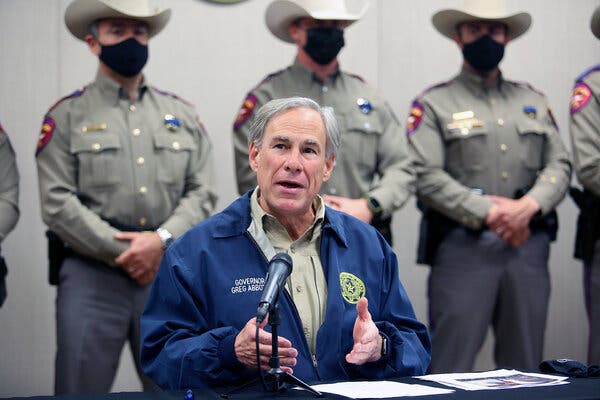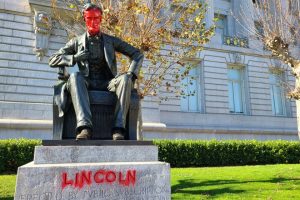A battle between state politicians and the large companies that generate jobs and tax revenue shows no signs of slowing after Gov. Greg Abbott of Texas announced a personal protest against Major League Baseball after its decision to move the All-Star Game out of Atlanta.
Corporate America began flexing its muscle after Georgia recently passed election restrictions, with companies including Coca-Cola and Delta Air Lines, which are headquartered in the state, publicly criticizing the changes. And now politicians are fighting back, at least symbolically.
Mr. Abbott, who is pushing similar election legislation in Texas, said on Monday that he was declining an invitation to throw out a ceremonial first pitch for the Texas Rangers, that the state would no longer pursue the All-Star Game, and that he would cease participating in any M.L.B. events.
“It is shameful that America’s pastime is not only being influenced by partisan political politics, but also perpetuating false political narratives,” the governor, a Republican, said in a letter he sent to the Rangers.
Lawmakers in more than 40 states are pursuing voting laws, with Republicans saying that limiting early voting, absentee balloting and poll watchers are necessary steps to ensure election integrity and Democrats warning that those changes would make it more difficult for people of color to vote.
It is a head-spinning new landscape for big companies, which are trying to appease Democrats focused on social justice, as well as populist Republicans who are suddenly unafraid to break ties with business. Individuals like Gregg Popovich, the Spurs coach who denounced the Texas bills before a game this weekend, are given some leeway to present their personal opinions. But companies are often caught in the middle, facing steep political consequences no matter what they do.
Georgia lawmakers have already voted for new taxes on Delta, and more than 100 other companies have spoken out in defense of voting rights.
“Business leaders are still facing challenges on how to navigate a range of issues, and the elections issue is among the most sensitive,” said Rich Lesser, the chief executive of Boston Consulting Group.
Hours after Mr. Abbott’s announcement, a broad swath of the political leadership throughout Harris County, Texas’ largest Democratic stronghold, criticized the state’s election proposals and called for broader engagement from the business world to help stop the efforts.
“These bills will go through unless we collectively stand up and say no,” said Mayor Sylvester Turner of Houston, a former Democratic legislator.
The mayor applauded Major League Baseball’s decision to move the All-Star Game and assailed Mr. Abbott for his public display of disapproval.
“There are a whole lot of people that can throw out that ball,” he said.

A top Senate official ruled on Monday that Democrats could use the fast-track budget reconciliation process for a second time this fiscal year, potentially paving the way for them to move within months to push through President Biden’s $2.3 trillion infrastructure plan over Republican opposition.
The ruling by the parliamentarian means that Democrats can essentially reopen the budget plan they passed in February and add directives to enact the infrastructure package or other initiatives, shielding them from a filibuster that requires 60 votes to overcome.
They had already used the budget maneuver, which is known as reconciliation, to push through Mr. Biden’s nearly $1.9 trillion stimulus last month without any Republican votes.
But with some Democrats reluctant to dismantle the filibuster, the rest of Mr. Biden’s agenda risks stalling amid Republican objections. With the Senate divided 50-50, Democrats effectively need 10 G.O.P. senators to join them to move forward on nearly any major legislation.
Seeking alternative avenues, Senator Chuck Schumer, Democrat of New York and the majority leader, had argued that the rules permitted the Senate to revisit the budget blueprint, which allowed for passage of the pandemic relief plan, and take at least one more crack at reconciliation before the end of the fiscal year on Sept. 30.
Because there was no precedent for doing so, Mr. Schumer asked Elizabeth MacDonough, the Senate parliamentarian, for guidance. On Monday, she blessed the gambit, according to Justin Goodman, a spokesman for Mr. Schumer.
The ruling “allows Democrats additional tools to improve the lives of Americans if Republican obstruction continues,” Mr. Goodman said in a statement, adding that “some parameters still need to be worked out.”
He said no final decision had been made on legislative strategy for another round of reconciliation this year, but added that her ruling “is an important step forward” in case Democrats decide to use this “key pathway.”
But the plan is sure to undergo rounds of debate and adjustments to woo the necessary support — even among Democrats. On Monday, Senator Joe Manchin III, a centrist Democrat from West Virginia, told a radio host in his home state, Hoppy Kercheval, that “as the bill exists today, it needs to be changed.”
Mr. Manchin said he was against raising the corporate tax rate to 28 percent, up from 21 percent, and would demand changes be made before voting on the bill.
“If I don’t vote to get on it, it’s not going anywhere,” he said, adding that several other Democrats were against the plan in the current form. “So we’re going to have some leverage here.”

The global economy is recovering from the coronavirus pandemic faster than previously expected, largely thanks to the strength of the United States, but the International Monetary Fund warned on Tuesday that major challenges remained as the uneven rollout of vaccines threatens to leave developing countries behind.
The I.M.F. said it was upgrading its global growth forecast for the year thanks to vaccinations of hundreds of millions of people, efforts that are expected to help fuel a sharp rebound in economic activity. The international body now expects the global economy to expand by 6 percent this year, up from its previous projection of 5.5 percent, after a contraction of 3.3 percent in 2020.
“Even with high uncertainty about the path of the pandemic, a way out of this health and economic crisis is increasingly visible,” Gita Gopinath, the I.M.F.’s chief economist, said in a statement accompanying the fund’s World Economic Outlook report.
The emergence from the crisis is being led by the wealthiest countries, particularly the United States, where the economy is now projected to expand by 6.4 percent this year. The euro area is expected to expand by 4.4 percent and Japan is forecast to expand by 3.3 percent, according to the I.M.F.
Among the emerging market and developing economies, China and India are expected to lead the way. China’s economy is projected to expand by 8.4 percent and India’s is expected to expand by 12.5 percent.
Ms. Gopinath credited the robust fiscal support that the largest economies have provided for the improved outlook and pointed to the relief effort enacted by the United States. The I.M.F. estimates that the economic fallout from the pandemic could have been three times worse if not for the $16 trillion of worldwide fiscal support.
Despite the rosier outlook, Ms. Gopinath said that the global economy still faced “daunting” challenges.
Low-income countries are facing bigger losses in economic output than advanced economies, reversing gains in poverty reduction. And within advanced economies, low-skilled workers have been hit the hardest and those who lost jobs could find it difficult to replace them.
“Because the crisis has accelerated the transformative forces of digitalization and automation, many of the jobs lost are unlikely to return, requiring worker reallocation across sectors — which often comes with severe earnings penalties,” Ms. Gopinath said.
The I.M.F. cautioned that its projections hinged on the deployment of vaccines and the spread of variants of the virus, which could pose both a public health and economic threat. The fund is also keeping a close eye on interest rates in the United States, which remain at rock-bottom levels but could pose financial risks if the Federal Reserve raises them unexpectedly.

For most Americans, the third stimulus payment, like the first two, arrived as if by magic, landing unprompted in the bank or in the mail.
But it’s not as straightforward for people without a bank account or a mailing address. Or a phone. Or identification.
Just about anyone with a Social Security number who is not someone else’s dependent and who earns less than $75,000 is entitled to the stimulus. But some of the people who would benefit most from the money are having the hardest time getting their hands on it.
“There’s this great intention to lift people out of poverty more and give them support, and all of that’s wonderful,” said Beth Hofmeister, a lawyer for the Legal Aid Society’s Homeless Rights Project. “But the way people have to access it doesn’t really fit with how most really low-income people are interacting with the government.”
Interviews with homeless people in New York City over the last couple of weeks found that some mistakenly assumed they were ineligible for the stimulus. Others said that bureaucratic hurdles, complicated by limited phone or internet access, were insurmountable.
Paradoxically, the very poor are the most likely to pump stimulus money right back into devastated local economies, rather than sock it away in the bank or use it to play the stock market.
“I’d find a permanent place to stay, some food, clothing, a nice shower, a nice bed,” said Richard Rodriguez, 43, waiting for lunch outside the Bowery Mission last month. “I haven’t had a nice bed for a year.”
Mr. Rodriguez said he had made several attempts to file taxes — a necessary step for those not yet in the system — but had given up.
“I went to H&R Block and I told them I was homeless,” he said. “They said they couldn’t help me.”



















